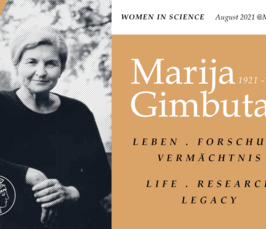Marija Gimbutas (1921-1994): Life – Research – Legacy
- Date: Aug 12, 2021
- Time: 03:30 PM - 08:00 PM (Local Time Germany)
- Location: MPI SHH Jena
- Room: Library Mezzanine
- Host: Equal Opportunity Officer
- Contact: bock@shh.mpg.de

When it comes to the question of the origin of Indo-European peoples or interdisciplinary approaches to the study of human history, one name has been mentioned consistently for more than 60 years: Marija Gimbutas. Born and raised in Lithuania, she earned her doctorate in Tübingen, and eventually became a successful scholar at the University of Los Angeles (UCLA). On August 12, 2021, the Max Planck Institute for the Science of Human History will proudly host an exhibition on Marija Gimbutas (1921-1994) and seize the opportunity to recall on her life, her research, and legacy. Current research approaches, such as those characteristic to the Max Planck Institute for the Science of Human History in Jena, were able to partially confirm one of her central theses – the Kurgan hypothesis. Modern Europe cannot be thought of without the Kurgan culture, which pushed westward from the southern Russian steppes by horse and wagon. Her later research on ancient European culture made her a leading figure in feminism, although she never considered herself a feminist. Even though many of her theses remain disputed, the idea of a "golden age" that was characterized by gender equality and peace persists as form of society worth striving for.
The opening of the exhibition will take place on August 12, 2021, 15:30 CEST in the Institutes’ library in compliance with the current requirements for the containment of the Covid-19 pandemic. In three ways, Lithuanian music will take us to the roots of Marija Gimbutas: to her homeland, to folklore as one of her sources for inspiration, and to the beginnings of her research devoted to the ancient history of Lithuania. A short lecture will outline Gimbutas significance for modern Indo-European studies. Afterwards, the exhibition can be visited, which was designed and planned by three PhD students and the Equal Opportunity Officer of the Max Planck Institute for the Science of Human History and supported by the Department of Prehistoric and Early Historic Archaeology of the Friedrich Schiller University Jena.